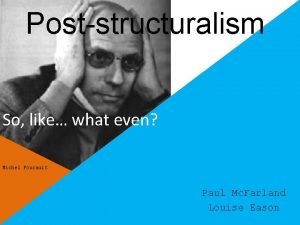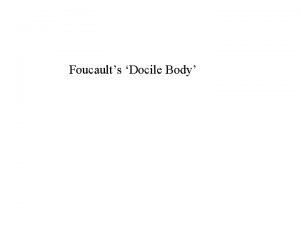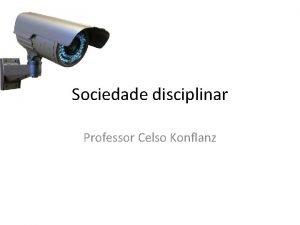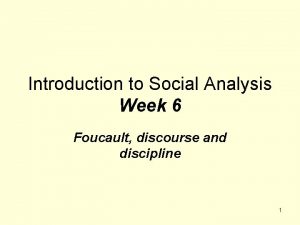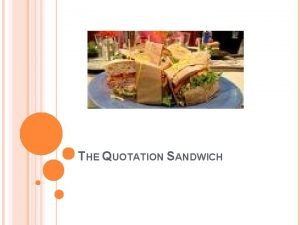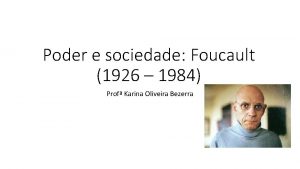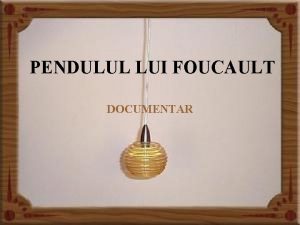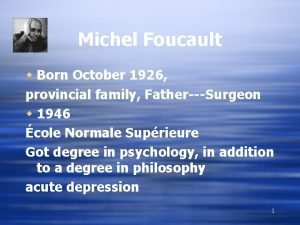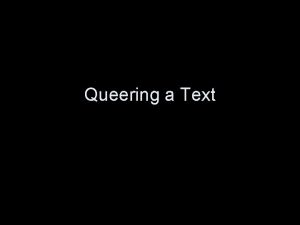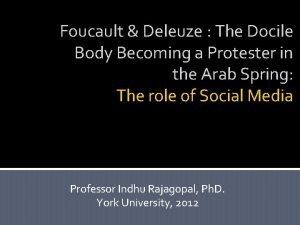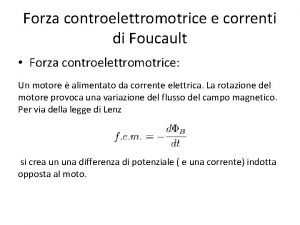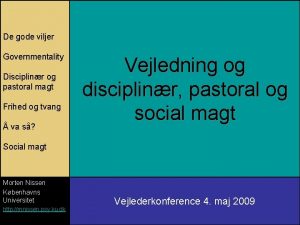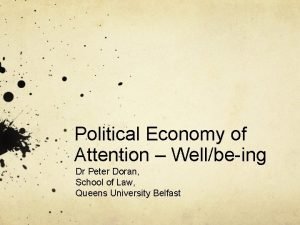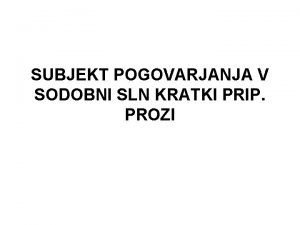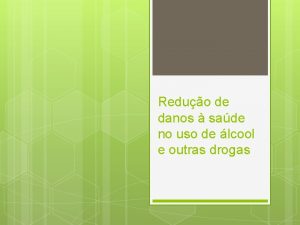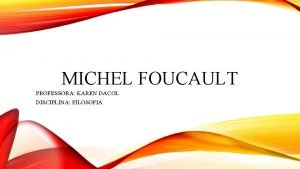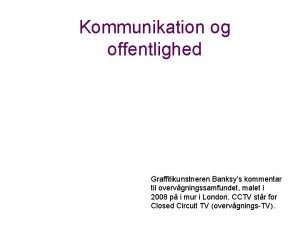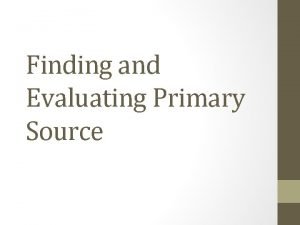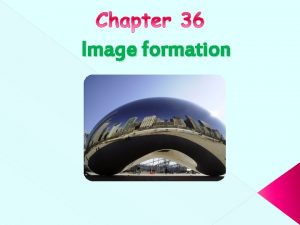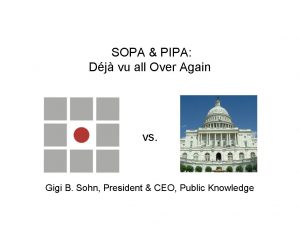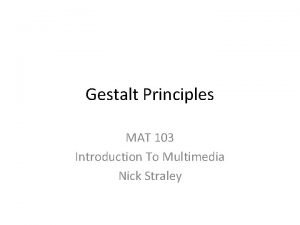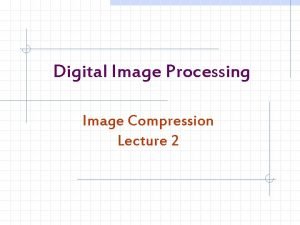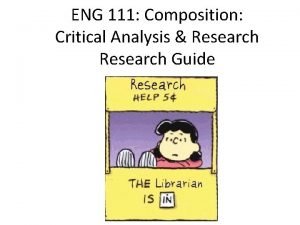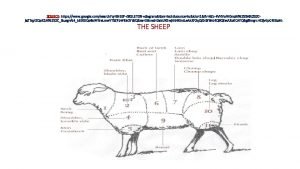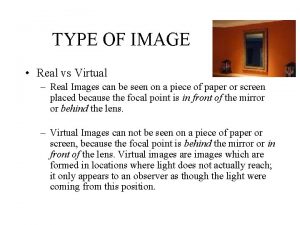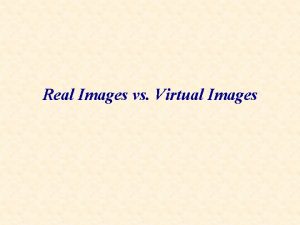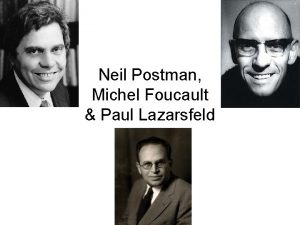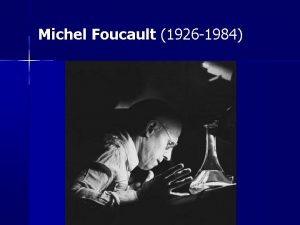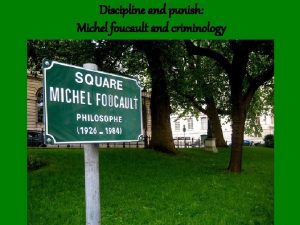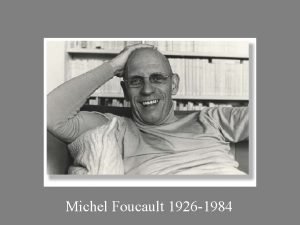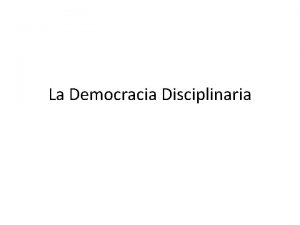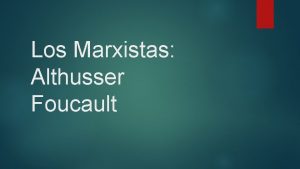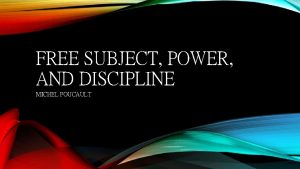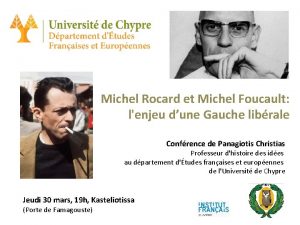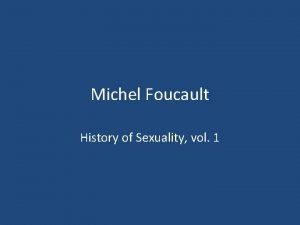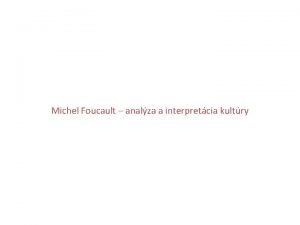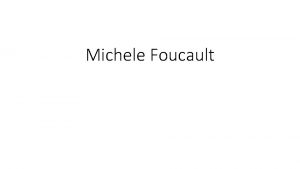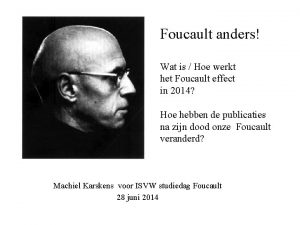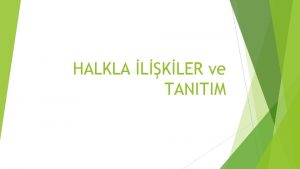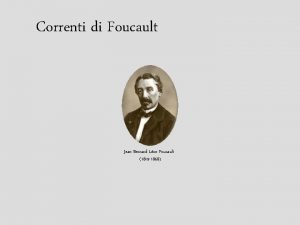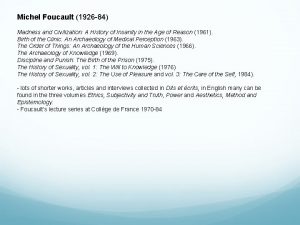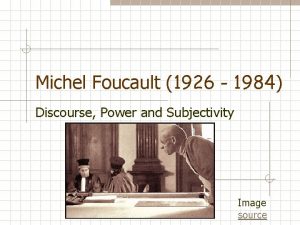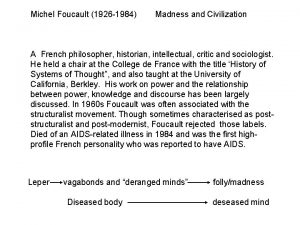Michel Foucault and Image source Foucault u Outline



































- Slides: 35

Michel Foucault and 瓊瑤 Image source: Foucault, u 瓊瑤

Outline Q & A: Literature, Ideology, Power & Discourse n Michel Foucault: Power, Knowledge and Discourse n Sociology of Literature & 瓊瑤‘s novels and films n

Q & A: Literature, Ideology, Power & Discourse n n n How do we do a Marxist reading of a story or a poem? How do we detect and analyze the ideology(ies) of a text? Is a text’s ideology the same with authorial ideology? Is authorial ideology the author’s own ideas? Is there anything outside of ideology? (In other words, is it possible to stand outside of ideology and resist it? ) How is the control of ideology similar to or different from that of hegemony, power and discourse?

Q & A: Literature, Ideology, Power & Discourse (2) How do we do a Marxist reading of a story or a poem? 1. Relations of production (class relations) in the text itself or in the production of the text; 2. Intrinsic study Ideology study history of capitalism n

Q & A: Literature, Ideology, Power & Discourse n 1. How do we detect and analyze the ideology(ies) of a text? With the support of some knowledge of society and history, examine and explain the text’s – – – 2. Contradictions (between the said and the unsaid, the characters, form and content, or different parts of the text); gaps; Distortion and disguise of economic reality and/or relations; Thus analyzed, the text’s ideology should be related to its contemporary social reality.

Q & A: Literature, Ideology, Power & Discourse n n Is a text’s ideology the same with authorial ideology? No. A text is a conjuncture of multiple ideologies (of literary production, general production, aesthetic ideology, etc. ) Is authorial ideology the author’s own ideas? No. Ideology is not, for Althusser, false consciousness; it is imagined relations produced by many ISA. The author lives in his ideologies, but not generating them. (This is an example of Althusser’s anti-humanism. )

Q & A: Literature, Ideology, Power & Discourse Is there anything outside of ideology? (In other words, is it possible to stand outside of ideology and resist it? ) n No, except for Marxism as a science. n

Q & A: Ideology, Power & Discourse n n n How is the control of ideology similar to or different from that of hegemony, power and discourse? Hegemony –(correcting textbook chap 5 p. 217) Althusser does refer to Gramsci’s hegemony respectfully*, but hegemony is NOT his central category of analysis. Instead, Althusser’s central terms are relative autonomy, overdetermination and contradiction. * Hegemony “new [concept]. . . A remarkable example of a theoretical solution in outline to the problems of the interpenetration of the economic and the political” (For Marx 114)

Q & A: Ideology, Power & Discourse n Similarity – 1. Invisible, non-violent and pervasive control (e. g. interpellation, consent and containment) 2. a more and more complicated view of social relations n Differences 1. – – – social formation network or grids A’s Ideology – structural perspective; ignores agency; – G’s Hegemony – counter-hegemonies formed by coalition F’s power and discourse –denies economic determinism, ignores agency; focused on knowledge’s role (Ref. Textbook chap 7 152 -53)

Michel Foucault (1926 - 1984) Has impact on areas such as -- Sociology, Historiography, Gay and Lesbian Studies, Marxism, Cultural Studies and Literary Studies (& New Historicism) Two Major Claims: -- Man is a product of modernity. -- Knowledge is not Truth, but power.

Foucault: General Ideas n 1) Two periods: (ref. Textbook 148) Archaeology of knowledge 知識考古學 Discourse & rules and strategies for the formation of subject-positions and knowledge. (e. g. Medicine, Madness) 2) Genealogy of power/knowledge 權力系譜學 – examines a variety of institutions and nondiscursive practices to show power/knowledge is pervasive (e. g. Prison, Sexuality)

Power and Knowledge/Truth Power -- disciplinary and normalizing power – both repressive, controlling and productive; n Operation: -- a perpetual series of observation and modes of control of conduct; n n Effects: -- “induces pleasure, forms knowledge, produces discourse” (1980: 119; textbook 153) producing “Truth”; normal subjects & docile bodies

Power and Knowledge/Truth Power –pervasive -- not just top-down; it circulates, working in multiple direction like “capillary (毛細管) movement. ” e. g. control and regulation of our health – 1) hospital: spatial arrangement: nursery station waiting room clinic examination room -- 2) ideological control: the posters, pamphlets. -- 3) pharmacy, insurance co. , etc. -- 4) government auth orit -- 5) school i n es

Penopticon: a metaphor for social control A circular building with the central control tower control internalized.

Penopticon n (textbook 150) Total Visibility of the prisoners, invisibility of guard, or anybody taking the position in the central control tower (subject position); n Isolation: cannot see the other prisoners in the other cells; internalize the control; disciplined when not watched. (151) n Soceity as 監獄群島carceral archipelago; Prison, penitentiary, rehabilitation center, Hospital, social worker, school, etc. Combining punitive system with normalizing practices n

Penopticon as a metaphor (textbook 149 -51) n an individual is distributed, located and examined in their fixed position. e. g. One Flew Over the Cuckoo’s Net -- the patients as willing subjects of medical science (since they are excluded from the world of normality). -- ways of discipline and surveillance: n -- public confession; clip 1, 2 what else? -- control of their space, schedule, value standard, and deprivation (of freedom, pleasures—gambling, sex, smoke--and self -decision)

Q: Power and Knowledge/Truth n Which types of social or self surveillance are legitimate, and which types, unnecessary? How about the current quarantine of SARS—a modern plague-patient? Do we really live in a prison-like penopticon?


Examples of surveillance n n n Police’s petrol and criminal records Traffic Control System Electronic Game Domicile Registration System and Census IC card

Other Systems of surveillance and discipline n n n Any system which includes and connects us (esp. through numbers): telephone, computer, student no. , banking system (account, credit card), user account no. , educational platform, The school’s merit/de-merit system; Discourse; e. g. A. 抗煞天使,前線英雄� 抗煞之戰,全台總動員, self-discipline – self-imposed home quarantine, wearing a mask; B. normal sex & the forbidden self-disciplined, normal sexual subjects

Discourse: Definition n Discourse is "a group of statements which provide a language for talking about. . . a particular topic at a particular historical moment. " Constructed through some discursive practices; Three major procedures of discursive formation : – Definition & Prohibition defining statements & Rules about the “sayable” and “thinkable” – Division and rejection; subject positions; exclusion of other statements – Opposition between false and true Authority/Power of knowledge (Truth) – (Ref. Textbook 154)

Discourse: Definition (2) Influences: -- productive: produces knowledge; -- regulative: (not unlike penopticon) offers us subject positions which is hierarchical. -- controlling and discriminatory: discipline the subjects and punish or exclude those who do not follow the rules.

Discourse: example (1) the discourse of Romantic Poetry -- values: imagination, nature, “Truth” -- methodology: quest poem, use of “common language, ” -- discursive practices: walking in nature, writing poetry, reviews, prefaces, etc. -- inclusion: the six poets; -- hierarchy and exclusion: the “poetesses” the formation of literary canon. hiring, examination and curriculum

Q: Discourse and Truth n n n Which of the following statements truth or part of a certain discourse, and what possible effects do they have? William Wordsworth creates the Immortality Ode. Our sexual desire is the source of our energy which can be both constructive and destructive. Any English major should know Shakespeare. Necrophilia, pedophilia, and sex with animal should not be allowed. We are born to be male or female, and taught to be man or woman.

Discourse: example (2) n 1. 2. 3. Sexuality as a discourse Discourses of sexuality have increased and become a science since the 17 th century, when sex in the West became a taboo. for normlization and regulation. Produces different subject positions and objects of gaze and control. “The sodomite had been temporary aberration; the homosexual was now a species. ” (1979 43) Sexual identities – “regulatory fictions” inscribed on our bodies.

Discourse: Sexuality (For reference) n 1. 2. Two Foucauldian views of sexuality and our body Sexuality – not something hidden but “a great surface network in which the stimulation of bodies, the intensification of pleasures, the incitement to discourse, the formation of knowledges, the strengthening of controls and resistances, are linked to one another. [modified] Body as an interface between internal forces (psychic, physiological) and the external social forces.

Literary Discourse: implications n n n No fixed boundaries between literature and other social practices; popular fiction such as those of 瓊瑤 can be discussed with some literary work. The author is not the creator of his work. S/he serves as a label to put on a group of works related to him. (e. g. Wordsworth discourse; 瓊瑤‘s discourse of Romantic love) Defining some subject positions (of the author, the reader, etc. )

Sociology of Literature: 3 Kinds n 1. Reflection: Examine social phenomena in the text; – – n understanding of society through literature; literature reflects society. 2. Influence: Examines how social environment and structure influence the production and circulation of literature. – sociology of literary production n 3. Interpretive analysis and institutional analysis combined

Methodology 1. 2. 3. 4. Textual analysis; Institutional analysis; Analysis of society and history; 批判/二度詮釋 discourse analysis -- the text itself is already an interpretation; 1. from the meaning of a text to the meaning structures (discourse) it is embedded in; 2. Disclose the relations between power and meanings.

Methodology (2): 8 units 1. 2. 3. 4. 5. 6. 7. 8. Text: narrative structure and structure of feeling (melodramatic, romantic, familial feelings); Author – Reader – e. g. teenagers’ release from reality Genre; conventions community’s consensus Literary community Rented Bookstore, Bookstores and Culture industry Institution society

Romantic Love 1) 2) 3) 4) The desire for union or merger; Idealization of the beloved; Exclusivity; (e. g. always, never) Emotional dependency or powerful concern for the beloved. (Cf. J. 5)

Romantic Love Discourse of 瓊瑤 Not seen as popular romance first; 2. Gradually codified into Romantic love story (while other aspects of the novels are ignored or emptied out) 3. Typical plot: love at first sight passion + obstacles overcoming the obstacles or death. n In 瓊瑤‘s novels,two basic forces are love and family: the obstacles are usu. from the family (generation gap and/or family love) restructuring of the family (Lin 20 -21) 1.

The Remote in the Romantic Love Discourse of 瓊瑤 一簾幽夢 (1974 http: //www. qyhouse. com/ebooks/vol 20. txt) Historical background – 70’s: after the white terror and the period of political upheaval and modernization 1971 退出聯合國;釣魚台事件; 1973 Ten Major Constructions; -- 1975 Yang Hsuan 楊弦: Modern Chinese Folksong Concert 中國現代民歌之夜, 1977 鄉土文學論戰 1979 中美斷交;Beautiful Island Event. 美麗島事件

The Remote in the Romantic Love Discourse of 瓊瑤 一簾幽夢 (1974 http: //www. qyhouse. com/ebooks/vol 20. txt) The remote: 1. The dreamy and poetic –signs: poem, guitar 2. The Western and far away –signs: 西餐廳, beautiful sceneries without identity. The unsaid: the political, the economic and the sexual. Examples 1, 2, 3

References n Miller, Peter. Domination & Power. Routledge: 12/01/1987.
 Foucault poststructuralism
Foucault poststructuralism Discontinuidad
Discontinuidad Foucault docile bodies
Foucault docile bodies The author function
The author function Michel foucault magt
Michel foucault magt Michel foucault
Michel foucault Michel foucault
Michel foucault Michel foucault pensamiento
Michel foucault pensamiento Michel foucault critical theory
Michel foucault critical theory Michel foucault summary
Michel foucault summary Example of topic outline and sentence outline
Example of topic outline and sentence outline Poder para foucault
Poder para foucault Pendulul lui foucault
Pendulul lui foucault Panopticon
Panopticon Foucault friendship as a way of life
Foucault friendship as a way of life Panoptico foucault
Panoptico foucault Foucault docile bodies
Foucault docile bodies Correnti di foucault
Correnti di foucault Pastoral magt
Pastoral magt Foucault
Foucault Foucault borges
Foucault borges Foucault principais ideias
Foucault principais ideias Foucault principais ideias
Foucault principais ideias Penopticon
Penopticon Panoptikon foucault
Panoptikon foucault Primary source outline
Primary source outline Image formation outline
Image formation outline Analog image and digital image
Analog image and digital image Image source:http://graphicdesign.spokanefalls.edu
Image source:http://graphicdesign.spokanefalls.edu Error free compression
Error free compression Source
Source Image source
Image source Ssswm
Ssswm Www google comsearch
Www google comsearch Real vs virtual
Real vs virtual Real vs virtual images
Real vs virtual images
